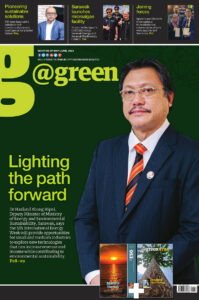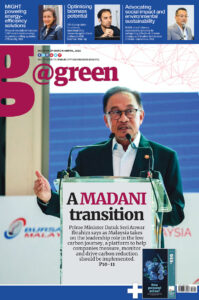Creating more jobs
Venturing into renewable sector can do that for youths
EMIRsing with … By Amanda Yeo
We are witnessing the loss of lives and livelihoods during this Covid-19 pandemic. However, the ongoing threat of climate change indicates the importance of creating more job opportunities for the youths to venture into the renewable sector rather than continuously working on fossil fuels.
This is especially in light of current difficulties among aspiring university graduates and fresh graduates in Malaysia who remain vulnerable in securing a decent job arising from the pandemic.
The National Employment Council (NEC) plans to create 500,000 jobs for Malaysians by the end of this year. But, it does not provide specifications on the number of new jobs in the renewable sector. NEC also does not indicate the number of jobs available for Malaysian youths.
The latest April figure shows that 742,700 individuals remained unemployed despite the decrease of 0.1 per cent in the unemployment rate in Malaysia to 4.6 per cent in April compared to 4.7 per cent in March.
On the other hand, the unemployment rate for youths aged 15 to 24 had increased to 13.7 per cent in April 2021 – 342,600 individuals.
During the past three weeks, the continuous rise of the Covid-19 cases raises concern that the rising unemployment among youths would provide a bleak future for aspiring university graduates and fresh graduates in Malaysia.
Since May 18, Malaysia has been reporting over 4,500 daily new Covid-19 cases for over one month.
As more financial allocation is required to train new hires with no working experience, employers, in general, are not motivated to hire fresh graduates under the current climate.
The Pew Research Centre’s International Science Survey, 2019-2020, revealed around seven in 10 Malaysians (73 per cent) place more priority on environmental protection. This even at the expense of economic growth and the creation of more job opportunities.
The international survey also discovered that out of 1,650 respondents, only 27 per cent chose job creation. Moreover, the National Youth Climate Change (NYCC) Survey Malaysia revealed that 92 per cent of young Malaysians think that climate change is a crisis.
Although there is some confusion on basic scientific climate concepts, most of the NYCC survey respondents generally have a good understanding of climate change.
Youths account for almost half of Malaysia’s population. It is time to create more job opportunities, providing more young Malaysians with the chance to work in the renewable sector besides advocating green recovery agenda.
This initiative allows Malaysia to reduce the usage of fossil fuels, and a shift to renewable energy can also encourage more youths to do good for social betterment.
Furthermore, Malaysia could move towards an economy based on low-carbon power sources with minimal greenhouse gas (GHG) emissions into the atmosphere, specifically carbon dioxide.
When Malaysia successfully transforms into a low-carbon economy, every dollar invested in climate adaptation can result in up to US$10 of economic benefit. This is according to Alok Sharma, President for COP26, the 26th United Nations Climate Change Conference will be in November this year.
In addition, a 2017 study in the journal Economic Modelling showed that investment in renewables could generate, on average, three times as many employment opportunities as a comparable investment in fossil fuels.
An analysis by the Goldman School of Public Policy at the University of California, Berkeley, added that switching over the grid to renewable sources could stimulate the creation of 500,000 jobs every year through 2035.
Therefore, with a wide array of natural resources such as fertile land for agriculture, minerals and extensive forests, Malaysia could build more low-carbon initiatives. This will generate more jobs.
Following are some of the low-carbon initiatives that could be implemented in Malaysia:
- Invest in reducing the cost of existing low-carbon energy-efficient technologies such as solar, wind and bio-energy;
- Introduce new performance-based targets and incentive systems, such as tax exemption for low-carbon vehicles for the transport sector;
- Introduce retail sales of biofuels such as ethanol in urban and rural markets;
- Introduce new market-based incentives for restoring degraded forests and increase the penalty for illegal logging;
- Reduce the tariff rate for low-carbon environmental goods and services and strengthen intellectual property regimes;
- Introduce reforestation to regulate water flows, act as barriers against storm surges and protect against erosion and mudslides;
- Introduce budgetary reforms with a gradual increase in energy taxes or carbon pricing; and
- Introduce performance-based tax incentive systems for achieving sectoral emission targets.
For Malaysian youths to reap the benefits of climate change adaptation through employment, EMIR Research has several policy recommendations for the government to consider:
- The ministries of industrial development, rural development, tourism, cultural and environment, and agriculture and fisheries could organise a joint meeting and utilise natural resources to create more green jobs for our youths. These ministries also could collaborate with industry players so that the skillsets among young Malaysians would match the current industry needs;
- The Ministry of Works (KKR) could develop climate-resilient infrastructure to generate youth employment opportunities besides protecting individuals and communities against natural hazards. For instance, irrigation infrastructure could limit the changing rain patterns on crops. Investment in the infrastructure for the conservation, treatment and supply of water is required, increasing both the number and quality of jobs in the country;
- The Ministry of Youth and Sports (MOYS) and Ministry of Environment and Water (MOEW) could organise youth dialogues with youth associations in Malaysia, enabling youth voices to heard at all levels of government, on company boards and in multilateral organisations. In turn, it would foster an intergenerational transfer of experience, knowledge and skills, serve as a bridge-builder against societal functions and decrease youth frustration;
- The same ministries could partner with the private sector to develop virtual apprenticeship, internship and upskilling programmes together where its youth would have the opportunity to acquire necessary technical skills besides securing a job in the renewable sector;
- The same ministries could make climate action more accessible and inclusive by moving the conversation beyond urban centres, encouraging youths from rural and lower-income families to participate; and
- The federal government perhaps could allocate funding to conduct Research and Development (R&D) in climate change adaptation with the State governments and local authorities, promoting green work among Malaysian youths.
When the current administration utilises young people’s potential as powerful change agents, Malaysia could reimagine a greener and more sustainable future through green job creation.
Amanda Yeo is Research Analyst at EMIR Research, an independent think tank focused on strategic policy recommendations based on rigorous research.








